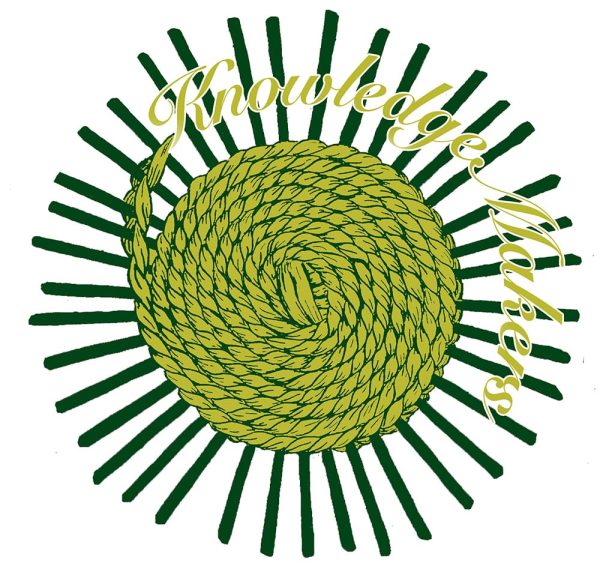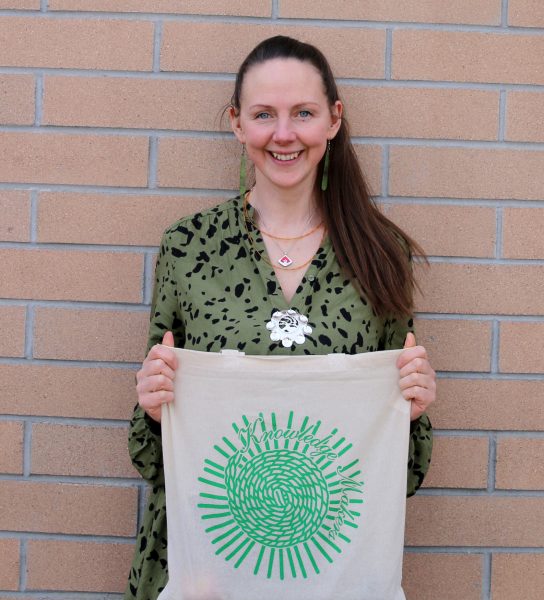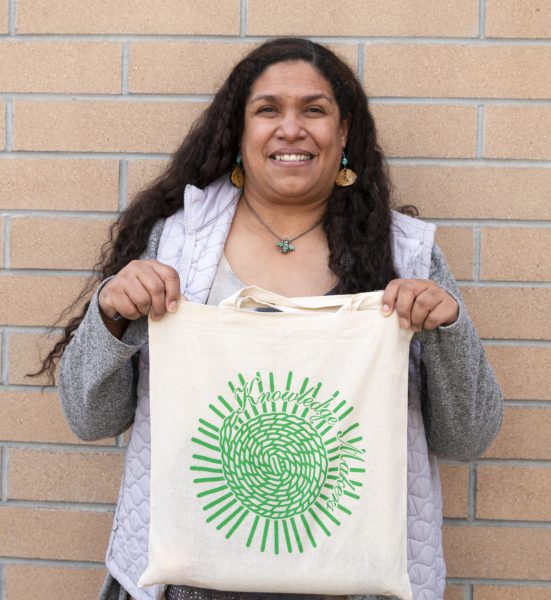By Kim Van Haren
Traditional knowledge from Indigenous peoples around the world came together at the Coyote Brings the Food conference at Thompson Rivers University (TRU) earlier this month.

The gathering was a celebration of the publication of a special edition of the Knowledge Makers Journal that was two years in the making, but that contains knowledge that goes back generations.
Sparked from a unique partnership between TRU’s Knowledge Makers program and the Food and Agriculture Organization of the United Nations that began in 2022, the conference involved 16 international Indigenous women sharing research on food security and sustainability issues. Several of the journal’s contributors, including Christine Olsen and Melanie Kirby, travelled to TRU to be part of the conference.
“Indigenous peoples have the solutions to address the issues we’re struggling with now on a large scale, such as food security and climate resiliency, and it is fantastic to be able to showcase knowledge from global Indigenous communities,” says Jeneen Herns-Jensen, associate director of the All My Relations Research Centre and leader of the Knowledge Makers program, who is of Algonquin, Shoshone and Norwegian settler descent.
“This special edition’s theme – centered on areas of Indigenous women, Indigenous peoples’ food and knowledge systems, and climate action – is a call for justice, equity and a sustainable future.”
Preserving traditional knowledge
Olsen is a member of Sweden’s Indigenous Sámi people, a doula and president of the Sámi women’s association, Niejda. She lives on a farm in Östersund with her partner, their three children and plenty of animals, including sheep, bees, hens and cats.

Christine Olsen
As author of the Knowledge Makers Journal article, It’s time to put the power of plants back into people’s hands, Olsen wants to preserve traditional knowledge about women’s health and food sovereignty.
“I want to see a world that acknowledges and honours the natural cycles — in nature as well as within women,” she says.
“I also want to see a world where we put the power of plants back into people’s hands. By that I mean that every human should know the land one is living on — what plants to eat and use as medicine, and the trees and animals as well. And for this to be possible, we need to acknowledge and raise the Indigenous people’s knowledge and wisdom, and we need to protect the areas that have wild nature as well as restore areas that have been depleted in different ways.”
When presented with the opportunity to collaborate with Knowledge Makers and contribute to the journal, Olsen was all in.
“There is so much knowledge and wisdom among elder Sámi people that I want to acknowledge and bring forth to our coming generations,” she says.
“In Sweden, where I live, it is hard to get research funds for traditional knowledge, so we in Niejda are looking for other fundings to preserve traditional knowledge about women’s health and plants. I saw that writing an article in this volume can increase our chances, and since I am not a professional researcher, I also saw this as a chance to get support in writing the article.
“This experience of contributing to the journal has really made me feel empowered that I can do valuable research being myself without being a professional researcher.”
Integrating Indigenous ecological knowledge
Kirby is from Tortugas Pueblo, a state-recognized tribal community in southern New Mexico. She lives in Santa Fe and works as an extension educator at the Institute of American Indian Arts, where she spearheads the Thunder Bee and Pollinator Stewardship programs. She is also a writer, mother, artist and professional beekeeper.

Melanie Kirby
“I specialize in queen bee breeding through my farm, Zia Queenbees,” says Kirby.
“I am a consilience researcher, which means I integrate diverse knowledge systems and perspectives into my work.”
Kirby crafted the Knowledge Makers Journal article, The importance of place, power and purpose in pollinator conservation, and has long been on a mission to integrate Indigenous ecological knowledge with western sustainable agriculture science.
“My article is focused on the practice of re-Indigenizing apiculture, meaning the act of recognizing that beekeeping has always been practiced first and foremost by Indigenous stewards in various parts of the world, and the approach and practice is interdisciplinary as we navigate the concepts and methods that are impressed upon by culture, epistemology and ontology.”
Kirby hopes her integrated style and quest for consilience inspires and motivates others to take action to support whole systems inquiry, assessment and practices.
“My goal is to encourage the process of interdisciplinary approaches to better support regenerative stewardship and to hold the door open so that Indigenous scholars, artists and communities can thrive and lead humanity into a post-modern construct that is inclusive, respectful and nurtures reciprocity.”
After contributing to the journal and attending the conference at TRU, Kirby is motivated to continue doing important work.
“I’ve really enjoyed working with the Knowledge Makers team and the women who participated in this cohort,” she says. “We’ve learned so much from each other, and I feel so enriched professionally and personally. I move forward with an overwhelming sense of solidarity which is really the highlight of this experience.”
Learn more about the conference and the special edition of the Knowledge Makers Journal here.
If you are an Indigenous woman and would like to share your experiences connected to women’s health, living in synchronicity with nature’s cycles and/or plant wisdom, please contact Christine Olsen at christine@moemo.se.

